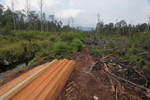Five villagers were shot in Indonesia’s Riau Province on the island of Sumatra during a clash in a land dispute over an oil palm plantation, reports The Jakarta Post and Republika.
The violence occurred when heavy machinery owned by PT Mazuma Agro Indonesia (MAI), a palm oil developer, moved into an area of land local residents claims as their own. As many as 200 villagers attempted to block MAI workers, who were accompanied by private security personnel and the Police Mobile Brigade (Brimob), a special operations unit run by the Indonesian police.
The victims were taken to a local hospital. Several villagers were also arrested.
According to the Riau Palm Oil Farmers Union, the dispute dates to 1998. The community of Batang Kumuh, which residents claim lies in Riau Province, says the 5,800-hectare site belongs to them, but MAI was issued a permit to develop the land by the government of North Sumatra Province. A court ruled in favor of Batang Kumuh last year, but MAI has since appealed the case to the Supreme Court and continues to work on the land.
The clash came just a day after the Ministry of Forestry said it will start to require applicants for forest concessions prove there aren’t overlapping claims on the lands they seek to develop.
Land conflict is common in Indonesia. Only 12 percent of the country’s forest area has been legally delineated leading local communities to sometimes take matters into their own hands when confronted by loggers and plantation developers. Worsening the situation, some companies rely on private security forces and police to forcibly evict customary forest users from their lands.
Related articles
Indonesia to require loggers prove their concessions free of overlapping claims
(02/02/2012) Applicants for forest concessions in Indonesia will soon be required to prove there aren’t overlapping claims on their holdings, reports The Jakarta Globe. The move, which offers the potential to reduce land disputes between forest developers and local communities, could complicate investments in the forestry sector in Indonesia.
Indonesia to investigate beheadings allegedly conducted by palm oil security forces
(12/17/2011) Indonesian President Susilo Bambang Yudhoyono has ordered an investigation into a grisly beheading of two men alleged by security forces hired to defend an oil palm plantation, reports The Jakarta Post.
Peace accord reached in violent conflict between locals and Indonesian state plantation company
(11/23/2011) A peace accord has been announced to resolve a long-running conflict between a giant state-owned plantation company and local communities on the Indonesian island of Java.
Concerns standoff between Borneo forest community and Malaysian palm oil developer may turn violent
(11/23/2011) A conflict between villagers in Indonesia’s East Kalimantan province and a palm oil developer could turn violent over the company’s decision to press forward with clearing of forest land used by the community, warns the Environmental Investigation Agency (EIA) and its Indonesian partner Telapak.
Fighting illegal logging in Indonesia by giving communities a stake in forest management

(03/10/2011) Over the past twenty years Indonesia lost more than 24 million hectares of forest, an area larger than the U.K. Much of the deforestation was driven by logging for overseas markets. According to the World Bank, a substantial proportion of this logging was illegal. Curtailing illegal logging may seem relatively simple, but at the root of the problem of illegal logging is something bigger: Indonesia’s land policy. Can the tide be turned? There are signs it can. Indonesia is beginning to see a shift back toward traditional models of forest management in some areas. Where it is happening, forests are recovering. Telapak understands the issue well. It is pushing community logging as the ‘new’ forest management regime in Indonesia. Telapak sees community forest management as a way to combat illegal logging while creating sustainable livelihoods.